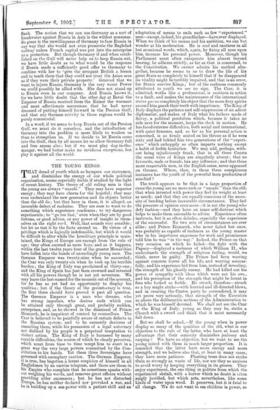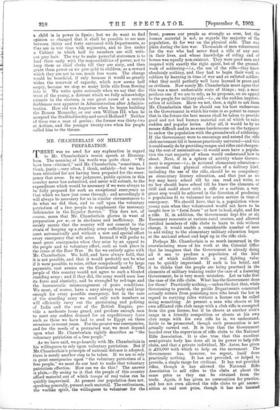THE YOUNG KINGS. T HAT dread of youth which so hampers
our statesmen, and diminishes the energy of our whole political organisation, seems especially feeble if studied by the light of recent history. The theory of old ruling men is that the young are always "unsafe." They may have superior energy ; they may have charm for the hopeful ; they may even understand the new generation and its objects better than the old do ; but they have in them, it is alleged, an incurable defect of rashness. They are sure to want to do something which experience condemns ; to try dangerous experiments ; to " go too fast," even when they are by good fortune, or good advice, or any power of insight in them- selves on the right rood. Well, that sounds very sensible ; but let us test it by the facts around us. By virtue of a privilege which is logically indefensible, but which it would be difficult to alter while the hereditary principle is main- tained, the Kings of Europe are exempt from the rule of age; they often succeed as mere boys, and as it happens, within the last twelve years four of the greater Monarchies have fallen into the hands of exceedingly young men. The German Emperor was twenty-nine when he succeeded ; the Czar was only twenty-six when he took up his terrible burden ; the King of Italy was proclaimed at thirty-one ; and the King of Spain has just been crowned and invested with all his powers though he is not yet seventeen. We may leave the last-named for the moment out of the account, for he has as yet had no opportunity to display his qualities ; but if the theory of the gerontocracy is true, the first three should have proved it past all question. The German Emperor is a man who dreams, who has strong impulses, who desires ends which can be attained only through great, and probably sudden, enterprises, and, as he showed in the dismissal of Prince Bismarck, he is impatient of control by counsellors. The Czar is believed to be painfully aware of certain defects in the Russian system, and to be earnestly desirous of amending them, while his possession of a legal autocracy not disliked by his people is a perpetual temptation to violent action. The King of Italy is harassed by many curable difficulties, the source of which he clearly perceives, which must from time to time tempt him to exert in a great way the very large powers committed by the Con- stitution to his hands. Yet these three Sovereigns have governed with exemplary caution. The German Emperor, it is true, has begotten a latent suspicion of himself in all Engliihmen by an unwise telegram, and there are those in his Empire who complain that he sometimes speaks with- out weighing his words, and removes great officers without providing abler successors; he has not disturbed Europe, he has neither declared nor provoked a war, and he is building up a, sea-power with a patient skill and an adaptation of means to ends such as few " experienced " men—except, indeed, his grandfather—have ever displayed. When we think of his means and his ambition, we can but wonder at his moderation. He is cool and cautious in all but occasional words, which, again, by fixing all eyes upon him, increase his personal power. Moreover, though his Parliament must often exasperate him almost beyond bearing, he adheres strictly, as far as that is concerned, to the Constitution. We cannot admire his method alto- gether, because he seems to us to draw the life of hie great State so completely to himself that if he disappeared its vitality might be terribly impaired, and that is an error, for States survive Kings; but of the rashness commonly attributed to youth we see no sign. The Czar, it is admitted, works like a professional, is cautious in action to a fault, and makes the maintenance of the international status quo so completely his object that the more fiery spirits around him gnash their teeth with impatience. The King of Italy displays the patience and self-suppression of an adroit diplomatist, and makes of Italy what his fathers made of Savoy, a political pendulum which, because it takes no side save for the moment, keeps the clock in motion. He has faced extreme difficulties, both social and international, with quiet firmness, and, so far as his personal action is concerned, is as firmly seated on his throne as if he were sixty and had behind him two generations of the "experi- ence " which unhappily so often imparts nothing except a habit of feeble hesitation. We may add, perhaps, with- out being injudiciously frank, that in all three Courts the usual vices of Kings are singularly absent ; that ito favourite, male or female, has any influence ; and that three more respectable men, in the English sense, never appeared on thrones. Where, then, in these three conspicuous instances has the youth of the powerful been productive of mischief ?
The truth appears to be that in a large proportion of cases the young are no more rash or " unsafe " than the old; that when invested with power they feel its weight at least. as much; and that they are equally conscious of the neces- sity of bending before inexorable circumstances. They feel the pressure of opinion even more—it is not the young who defy fashion—and they have an inner self-distrust which helps to make them amenable to advice. Experience often. instructs, but it as often deludes, especially the experience of the successful. No two sets of circumstances are ever alike ; and Prince Bismarck, who never failed but once, was probably as capable of rashness as the young master who in his impetuous eagerness for work and prominence told him he was " in the way." Indeed, the Prince on that very occasion on which he failed—the fight with the Papacy—displayed a rashness of which William II., who understands the strength of religious feeling, would, we think, never be guilty. The Prince had been warring against concrete forces all his life, and warring success- fully, and his experience hid from him, instead of revealing, the strength of his ghostly enemy. He had killed out his power of sympathy with ideas which were not his owl., and his perception of the strength that might be latent in foes who looked so feeble. He struck, therefore—struck as a boy might strike—with hurried and ill-directed blows, and in creating the Centre party he surrendered, it may yet prove very seriously, that strength of the Executive as above the deliberative sections of the Administration to which he was himself devoted. We shall not see the Czar or the King of Italy, young as they may be, strike a, Church with a sword and think that it must necessarily fall down.
But we shall be asked,—If the young when in power display so many of the qualities of the old, what is our objection to the rule of the latter, who have at least the advantage that their seniority diminishes jealousy and carping We have no objection, but we want to see the young mixed with them in much larger proportion. It is conceded that the latter have more energy and more strength, and we believe also that, at least in many cases, they have more patience. Planting trees does not strike them so strongly as waste of life, nor are they so anxious to avoid worry by keeping everything in its groove. They enjoy experiment, the one thing in politics from which the experienced shrink, with a horror which no doubt is often amply justified, but which acts, nevertheless, like some kinds of water upon wood. It preserves, but it is fatal to all change. We do not want to see children in power, as a child is in power in Spain ; but we do want to find opinion so changed that it shall be possible to see men between thirty and forty entrusted with Departments, as they are in war time with regiments, and to live under a Cabinet in which half its members are still with- out grey hair. The way to make powerful statesmen is to load them early with the responsibilities of power, not to keep them as chief clerks till they are sixty, and then grant them power as we give gold to children, as a reward which they are not to use, much less waste. The change would be beneficial, if only because it would so greatly widen the reservoir of capacity, which now seems half empty, because we stop so many little rills from flowing into it. We write quite seriously when we say that dis- trust of the young, a distrust which we fully acknowledge extends to the electors, is one great cause of a certain feebleness now apparent in Administration after Adminis- tration. How old was Augustus when be began building the Roman Monarchy, or our own William III. when he accepted the Stadtholdership and saved Holland ? Neither of these was a man of genius ; the former was thirty-two at Actium, and the younger twenty-two when his people called him to the throne.







































 Previous page
Previous page